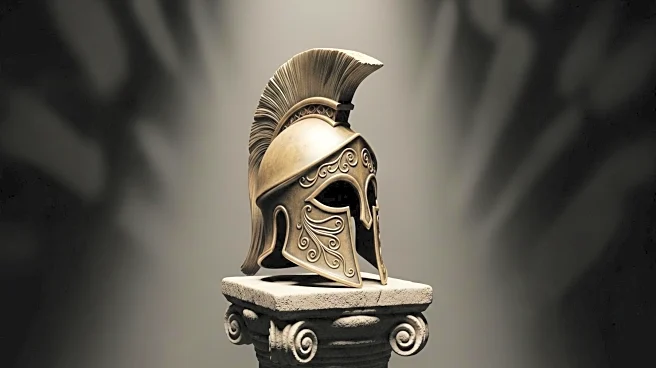What's Happening?
The Malthouse Theatre in Melbourne is showcasing a new production titled 'Troy,' which offers a contemporary interpretation of Homer's Iliad. Directed by Ian Michael and written by Tom Wright, the play integrates elements from various ancient texts, including works by Aeschylus, Euripides, and Virgil, alongside Wright's own inventions. The production features a unique set design by Dann Barber, with costumes that blend ancient world aesthetics with Old Hollywood glamour. The narrative focuses on Cassandra, portrayed by Elizabeth Blackmore, who embodies the silent scream of despair as she foresees the fall of Troy. The play also explores the relationship between Achilles and Patroclus, adding depth to the storyline. The production is noted for its dynamic lighting and sound composition, creating a haunting and immersive experience.
Why It's Important?
This production of 'Troy' is significant as it revitalizes a classic tale with modern sensibilities, making it relevant to contemporary audiences. By incorporating elements from various ancient texts and adding new interpretations, the play offers a fresh perspective on the themes of war, fate, and human emotion. The production's innovative approach to storytelling and design highlights the enduring relevance of ancient myths in understanding current global crises. It also demonstrates the power of theatre to evoke emotional responses and provoke thought, reinforcing its role as a vital cultural medium.
What's Next?
The play is scheduled to run at the Malthouse Theatre until September 25, 2025. As audiences continue to engage with this reinterpretation of the Iliad, it may inspire further adaptations and discussions around the themes presented. The success of 'Troy' could lead to more productions that blend classical texts with modern elements, encouraging a broader exploration of ancient narratives in contemporary theatre.
Beyond the Headlines
The production of 'Troy' raises questions about the role of myth in modern society and how ancient stories can be adapted to reflect current issues. It challenges audiences to consider the cyclical nature of history and the ways in which human experiences remain constant despite changing contexts. The play's focus on Cassandra's plight also highlights themes of belief and prophecy, encouraging reflection on how societies interpret and respond to warnings and predictions.










